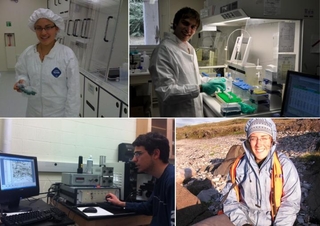How To Find Opportunities (or, for advisors, interested students)
- Students are encouraged to take initiative in seeking out potential advisers for research, introducing themselves by email and setting up appointments to discuss specific opportunities.
- Faculty are generally excited to bring students into their labs, so your emails are most welcome. If faculty are slow responding, they may be swamped, so consider re-sending emails again after a week and reach out to the DUS for help if needed.
- Potential advisors: if you have projects that you’d like to advertise, send an email of the opportunities to the DUS and/or ask the Instagram account managers (see Club Geo page) to post them.
General Considerations:
Research topics in EPS are highly variable, not only in the problems being addressed (climate, energy & environment, paleontology, seismology, etc.), but also in the day-to-day operations of the work. For example, some research topics are strongly field-oriented, whereas others may involve more extensive laboratory work or computer programming. Undergraduates considering research should first decide whether they plan to do their research during the semester or the summer, or both. They should also think about the kind of day-to-day work activities they envision for themselves, which can broadly be grouped into the categories of field work, laboratory work, or computer programming. Much information on research topics can be gained by browsing the Yale EPS faculty web pages.
Credit, Volunteer, or get Paid?
If research is planned during the semester, then students should choose among three options: work for course credit (EPS488a or EPS489b, available to juniors and seniors with DUS approval), work for pay, or volunteer.
Although work for pay is dependent on the availability of funds (opportunities are listed below), EPS is committed to welcoming all students in to our research labs. We realize that unpaid work is a major barrier for many students. Please do not hesitate to ask to be paid (many professors may assume informal volunteering is preferred or may not realize funds exist for payment). If funds are needed to pay you, and you’ve exhausted the opportunities listed below (or the timing doesn’t work), please reach out to the DUS at office hours or by email. Extensive field work is not possible during the school term, thus research at these times is limited to laboratory-based or computer-intensive work. Individual work and wage plans can be devised by each student in consultation with his or her potential adviser.
If research is planned during the summer, students should begin planning as early as the preceding December, for many of the funding opportunities have application deadlines in January or February (see below). Field work usually entails funding of all travel and cost-of-living expenses, but no further salary for time in the field. However, field projects are usually only 2-6 weeks long, so it may be possible to divide one’s summer into a field component and a laboratory- or computer-based component. Individual work and wage plans can be devised by each student in consultation with his or her potential adviser.
Many research fellowship opportunities are listed, and arranged by application deadline, on the Yale College Science & Quantitative Reasoning website.
In support of research in Geology & Geophysics, there are the following specific opportunities:
- Karen Von Damm ‘77 Undergraduate Research Fellowships in EPS – Applications due in Nov-Dec.
- Yale Tetelman Fellowships for International Research in the Sciences – Applications due in Feb.
- Yale Environmental Summer Fellowship – Applications due in Feb.
- Yale College Dean’s Research Fellowships (including the Heywood Fellowship for the Physical Sciences) – Applications due in March.
